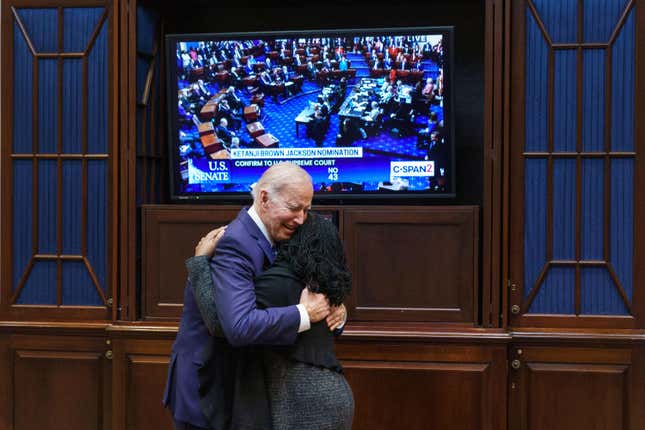
President Joe Biden and Vice President Kamala Harris are scheduled to speak today at a White House ceremony honoring newly-confirmed Supreme Court Justice Ketanji Brown Jackson, who will also speak.
After weeks of bad news—inflation, Russia, and more covid cases, the confirmation was a big win for the president. On Thursday, Jackson was confirmed as the first Black woman to become a Supreme Court Justice in a historic 53-47 vote in the U.S. Senate. Her confirmation followed a weeks-long process in which she was vilified with derogatory and racist attacks on her judicial record but which also revealed deep hopefulness among generations of Black women attorneys who have faced glass ceilings in their profession.
“This is one of the great moments of American history,” said Sen. Chuck Schumer (D-N.Y.), in remarks immediately before the vote. “Today, we are taking a giant, bold and important step on the well trodden path of fulfilling our country’s founding promise. This is a great moment for Judge Jackson, but it is an even greater moment for America as we rise toward a more perfect union.”
Jackson, 51, is currently a judge on the D.C. Court of Appeals. She will take her seat as the 116th justice on the Court later this summer, following the retirement of Justice Stephen Breyer. She won’t change the Court’s ideological makeup, with the balance of power remaining at six justices appointed by Republicans to three nominated by Democrats.
The need for Vice President Kamala Harris to cast a history-making, tiebreaker vote in favor of Jackson in an evenly-divided Senate evaporated with the announcement of three Republican senators’ support for the nomination last week. But Harris, the nation’s first Black and first woman vice president, presided over the vote in her capacity as president of the Senate. The roll-call vote began at 1:45 p.m. and concluded at 2:17 p.m.
“On this vote, the ‘yays’ are 53, the ‘nays’ are 47 and this nomination is confirmed,” Harris said after the final vote was tallied, to a loud ovation in the Senate chamber.
Jackson holds an undergraduate degree from Harvard College and a law degree from Harvard Law School. She will be the only justice on the Supreme Court to have worked as a federal public defender. She clerked for two judges on the federal bench, as well as Justice Breyer.
She became a judge after being nominated to a federal District Court seat in 2010 by her fellow Harvard alumnus, former President Barack Obama. She was even considered a potential SCOTUS nominee under Obama after the late Justice Antonin Scalia died unexpectedly in 2016. Instead, Obama nominated current Attorney General Merrick Garland, who never received a confirmation hearing in the then GOP-controlled Senate.
Garland is currently attorney general in the Biden Administration. Jackson was nominated and confirmed to succeed him for her current seat on the U.S. Court of Appeals for Washington, D.C., which is considered second to only the Supreme Court in the scope of its judicial power.
Jackson’s cases and opinions have been consequential. She was a member of the federal sentencing commission that overhauled mandatory minimum drug punishments. She also found herself opposing many controversial legal moves by the Trump administration.
She also served on the bipartisan U.S. Sentencing Commission for four years.
During her confirmation hearings, she endured attacks from Republicans over her judicial record, with several referencing her past sentencing decisions in cases that involved people convicted of child pornography offenses. Other judges across the ideological spectrum spoke in support of her judicial record.
Her confirmation hearings also became a venue for Republicans to score political points by bringing up topics such as critical race theory, which is currently not an issue in any case before the Court. But Sen. Cory Booker (D-N.J.) also used the hearings to speak forcefully in support of Jackson and other Black women who have faced unfair treatment in their professional lives.
Finality of Jackson’s confirmation was delayed by several minutes, as 99 Senators had cast their votes but Sen. Rand Paul (R-KY), wasn’t on the Senate floor. He voted against confirmation.
Republican Senators Susan Collins (R-Maine), Lisa Murkowski (R-Alaska) and Mitt Romney (R-Utah), all voted in favor of confirmation. Sen. Tim Scott (R-S.C.), the only Black Senator, cast a “no” vote.

